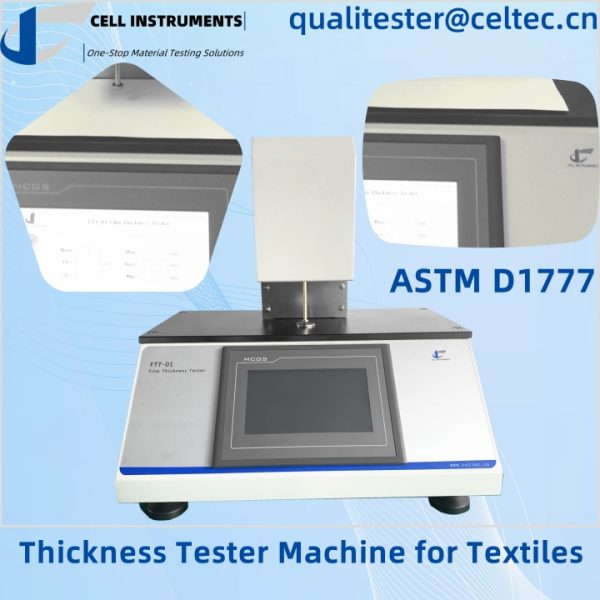How Thickness Testing Machines Enhance Textile Production: A Look at ASTM D1777 Standards
Introduction
Thickness testing machine for textile play a vital role in ensuring the quality and consistency of textile materials. As the industry continues to demand greater accuracy and standardization, the importance of reliable testing equipment cannot be overstated.
Importance of Thickness Testing Textile for Textile
The thickness of a textile material is a critical parameter that affects the performance of the material in a variety of applications such as apparel, furniture upholstery, and industrial textiles. Accurate thickness measurement is essential to maintain product quality, ensure material durability, and meet industry specifications.
How Thickness Testing Machine for Textile Work
Thickness testing machine for textile work on the principle of displacement measurement, where a sensor detects the distance between the surface of the material and a reference point. This method ensures non-destructive testing, providing accurate measurements while maintaining the integrity of the sample.
Key Standards for Textile Thickness Measurement
- ASTM D1777: This standard specifies the test method for the thickness of textile materials. Compliance with ASTM D1777 ensures accurate and repeatable measurement results, which is essential for quality control.
- ISO 3034: This international standard specifies the test method for the thickness of paperboard and is also applicable to textile materials. Following the ISO 3034 standard helps manufacturers meet global quality standards.
Applications of Thickness Testers in the Textile Industry
Thickness testers are widely used in various areas of the textile industry:
- Apparel and clothing: Ensure the consistency of fabrics to produce high-quality clothing.
- Industrial textiles: Maintain material properties in applications such as filters, insulation materials and geotextiles.
- Home furnishings: Verify the thickness of products such as carpets, curtains and furniture upholstery.
Advantages of Using Advanced Thickness Testing Machine
- High precision and accuracy: Modern machines minimize deviations and ensure reliable results, which is essential for both quality control and research and development.
- Versatility: These machines are indispensable in a variety of textile applications because they are able to measure a wide range of materials.
- User-friendly: Equipped with intuitive software and touch screen, they are easy to operate and reduce the possibility of errors.
- Compliance with international standards: By following standards such as ASTM D1777 and ISO 3034, manufacturers can ensure that their products meet global quality requirements.
- Case Study: Improving Textile Quality with Thickness Testing
A leading textile manufacturer wanted to improve product consistency by incorporating thickness testing into their quality control process. By using a thickness tester that complies with ASTM D1777, they significantly improved product consistency, which resulted in increased customer satisfaction and reduced material waste.
Choosing the Right Thickness Tester
When choosing a thickness tester, factors such as measurement range, resolution, and the ability to customize settings should be considered. Cell Instruments’ textile thickness tester is a great choice, with high accuracy, durability, and compliance to industry standards such as ASTM D1777 and ISO 3034.
Conclusion
Thickness testers are an indispensable tool in the textile industry because they ensure product quality and compliance with international standards. By investing in advanced testing equipment, manufacturers can improve their quality control processes, reduce waste, and meet changing market demands.
Frequently Asked Questions
What does ASTM D1777 mean for textile thickness measurement?
ASTM D1777 provides a standardized method for measuring textile thickness, which ensures accurate and consistent measurement results across different labs and applications.
How do textile thickness testers work?
These machines use a displacement method to measure the distance between the surface of the textile material and a reference point, providing precise thickness measurements without damaging the sample.
Why is ISO 3034 essential for textile testing?
ISO 3034 ensures that thickness measurements meet international quality standards, which is critical for global trade and production consistency.
Can thickness testers measure multiple types of textiles?
Yes, advanced thickness testers have the versatility to measure a wide range of textile materials, from delicate fabrics to industrial textiles.
What are the benefits of using a textile thickness tester from Cell Instruments?
With high accuracy, easy operation, and compliance with major standards such as ASTM D1777, this instrument is ideal for improving textile quality control.
Related Products
Benchtop Film Thickness Tester
Related Article
Film Thickness Tester for Packaging
Lab Thickness Tester for Paper
Thickness Tester for Thin Films
Bench Thickness Tester for Textile
Reference

